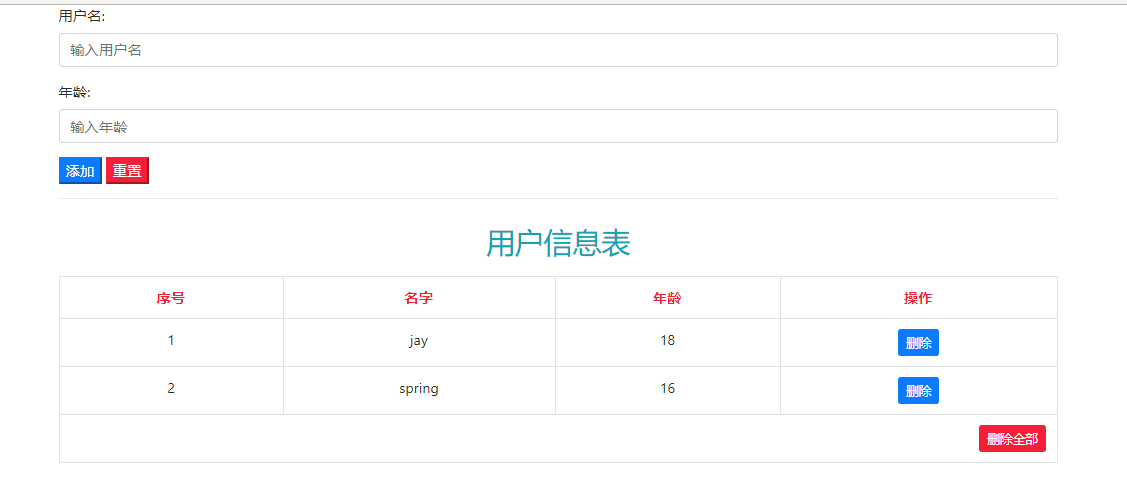vue学习笔记—bootstrap+vue用户管理
vue,读音view,简单易用的前端框架。特点如下:
1.一个mvvm的前端框架,内部做好了html中dom对象和后台用js语言定义的变量的双向绑定
2.中国人尤雨溪维护的个人项目,中文资料多,和google维护的angular框架相似
.....
bootstrap,一个css库,内部定义了很多样式类型(btn btn-sm btn-danger text-center table....),dom元素中class赋值相应的样式类型,则有相应的风格。比传统的好看。
学习视频:https://pan.baidu.com/s/16WCTG3yY-dIA2YXasw6csA
说明:
a学习的时候vue2.x版本,和视频中的某些功能实现有出入
b IDE后来选择了webstorm,其智能提示目前比vscode做得好一些。
1 初识vue
a.引用库文件 可以引用下载下来的库文件,可以引用url
在<header>内填写
<!DOCTYPE html>
<html lang="en">
<head>
<meta charset="UTF-8">
<title>Document</title>
<script src="https://cdn.jsdelivr.net/npm/vue/dist/vue.js"></script>
<script>
window.onload = function () {
const controller = new Vue({
el: "#app", //选择器
data: {
msg: "hello vue"
}
});
}
</script>
</head>
<body>
<div id='app'>
<h2>{{msg}}</h2>
</div>
</body>
</html>
上述code的说明:
a.如果把 window.onload里 的function中的vue实例的const去掉,该实例则为全局变量,此时可用浏览器的调试工具(F12)中的控制台,输入controller.msg='nihao',html中对应刷新nihao
b.vue中的el表示element,表示选择器,可以填写id,例如#app;可以填写class ;可以填写 html中元素类别名称,例如div。但是选择器对应的标识不能对应html和body,会出错。
c html中引用{{xxxx}} xxxx是data中定义的字段,这种写法引用变量的内容
vue实例中的data是一个json的变量,里面可以定义不同类型的字段,支持bool,double,array,json,string...
例如:
data:{msg:"hello vue",
msg2:12,
msg3:true,
arr:['apple','orange','banana'],
json:{a:'apple',b:'orange',c:'banana'}
}
<!DOCTYPE html>
<html lang="en">
<head>
<meta charset="UTF-8">
<title>Document</title>
<script src="https://cdn.jsdelivr.net/npm/vue/dist/vue.js"></script>
<script>
window.onload=function(){
const controller = new Vue
({
el:"div",//选择器
data:{msg:"hello vue",
msg2:12,
msg3:true,
arr:['apple','orange','banana'],
json:{a:'apple',b:'orange',c:'banana'}
}
});
};
</script>
</head>
<body>
<div>
<!-- 双向数据绑定 -->
<input type="text" v-model='msg'>
<br>
<input type="text" v-model='msg'>
<br>
{{msg2}}
<br>
{{msg3}}
<br>
{{arr}}
<br>
{{json}}
</div>
</body>
</html>
2.v-for
用于结合html中的ul,ol,table循环迭代data中集合元素的语法
例如在ul标签中可以
<!DOCTYPE html>
<html lang="en">
<head>
<meta charset="UTF-8">
<title>Document</title>
<script src="https://cdn.jsdelivr.net/npm/vue/dist/vue.js"></script>
<script>
window.onload = function () {
const controller = new Vue({
el: "div", //选择器
data: {
arr: ['apple', 'orange', 'banana'],
json: {
a: 'apple',
b: 'orange',
c: 'banana'
}
}
});
};
</script>
</head>
<body>
<div>
<ul v-for="(v,index) in arr">
<li> {{v}} {{index}}</li>
</ul>
<hr>
<!-- value,key,index顺序莫颠倒 -->
<ul v-for='(value,key,index) in json'>
<li>
value:{{value}} key:{{key}} index {{index}}
</li>
</ul>
<hr>
</div>
</body>
</html>
上述代码中:
v-for后跟字符串,由于是弱类型,解析型的语言,新手容易出错。
不需要index信息则 v-for=‘value in arry’则可,需要index信息则v-for='(v,index) in arr' 其中v,index 为自定义名,视频教学中说不这样写可以写$index,实际上不行,可能是版本不同的问题。
3.v-mode
指定html中的元素绑定到vue实例中的data的变量上,可以多个html元素绑定到同一份的实例数据,例如2个html textbox同步内容。
<!DOCTYPE html>
<html lang="en">
<head>
<meta charset="UTF-8">
<title>Document</title>
<script src="https://cdn.jsdelivr.net/npm/vue/dist/vue.js"></script>
<script>
window.onload=function(){
const controller = new Vue
({
el:".box",//选择器
data:{msg:"hello vue",
foods:['apple','orange','banana']}
});
};
</script>
</head>
<body>
<div class='box'>
<!-- 双向数据绑定 -->
<input type="text" v-model='msg'>
<br>
<input type="text" v-model='msg'>
</div>
</body>
</html>
4.v-show
用于控制html元素的显示和隐藏
<!DOCTYPE html>
<html lang="en">
<head>
<meta charset="UTF-8">
<title>Document</title>
<script src="https://cdn.jsdelivr.net/npm/vue/dist/vue.js"></script>
<script>
window.onload = function () {
const controller = new Vue({
el: "div", //选择器
data: {
show:true
},
methods: {
hide: function () {
this. arr.push ('tomato')
}
}
})
}
</script>
</head>
<body>
<div>
<input type="button" value="clickme" v-on:click="show = false">
<div style="width:100px;height:100px;background:red" v-show="show"></div>
</div>
</body>
</html>
5.事件v-on
html元素中使用 v-on:事件名="方法名" 为html事件注册事件响应方法
方法定义在vue实例中的json的methods的字段内,该methods字段也是一个json,内部可以定义多个方法。
事件名可以是click mouseover mouseleave dblclick...
例如:
<!DOCTYPE html>
<html lang="en">
<head>
<meta charset="UTF-8">
<title>Document</title>
<script src="https://cdn.jsdelivr.net/npm/vue/dist/vue.js"></script>
<script>
window.onload = function () {
const controller = new Vue({
el: "div", //选择器
data: {
arr: ['apple', 'orange', 'banana'],
json: {
a: 'apple',
b: 'orange',
c: 'banana'
}
},
methods: {
add: function () {
this. arr.push ('tomato')
}
}
})
}
</script>
</head>
<body>
<div>
<input type="button" value="clickme" v-on:click="add()">
<br>
<ul v-for='value in arr'>
<li>{{value}}</li>
</ul>
<hr>
<ul>
<li>a</li>
<li>b</li>
</ul>
</div>
</body>
</html>
6.用户管理
使用了bootstrap和vue实现了用户管理功能,可以新增,删除用户;
bootstrap用于优化美化布局 对html元素使用class声明赋值。做出了一个比传统风格好看的界面。

<!DOCTYPE html>
<html lang="en">
<head>
<meta charset="UTF-8">
<title>Title</title>
<link rel="stylesheet" href="lib/bootstrap.min.css">
<script src="lib/jquery-3.3.1.min.js"></script>
<script src="lib/bootstrap.js"></script>
<script src="lib/vue.js"></script>
<script>
window.onload=function () {
const control = new Vue({
el:"#app",
data:{
msg1:'hello',
myData:[{name:"jay",age:'18'},
{name:"spring",age:'16'}
],
username:'',
age:'',
nowIndex:-1
},
methods:{
add:function () {this.myData.push({name:this.username,age:this.age});
this.reset()
},
reset:function(){this.username='';this.age='';},
deleteData:function(n) {
if(n==-2)
this.myData=[];
else
this.myData.splice(n,1);
}
}
})
}
</script>
</head>
<body>
<div id="app" class="container">
<form role="form">
<div class="form-group">
<label for="username">用户名:</label>
<input type="text" id="username" class="form-control" placeholder="输入用户名" v-model="username">
</div>
<div class="form-group">
<label for="age">年龄:</label>
<input type="text" id="age" class="form-control" placeholder="输入年龄" v-model="age">
</div>
<div class="form-group">
<input type="button" value="添加" class="btn-primary" v-on:click="add">
<input type="reset" value="重置" class="btn-danger" >
</div>
</form>
<hr>
<table class="table table-bordered table-hover">
<caption style="caption-side:top" class="h2 text-info text-center">用户信息表</caption>
<tr class="text-center text-danger">
<th>序号</th>
<th>名字</th>
<th>年龄</th>
<th>操作</th>
</tr>
<tr class="text-center" v-for="(item,index) in myData">
<td>{{index+1}}</td>
<td>{{item.name}}</td>
<td>{{item.age}}</td>
<td>
<button class="btn btn-sm btn-primary" data-toggle="modal" data-target="#layer" v-on:click="nowIndex=index">删除</button>
</td>
</tr>
<tr v-show="myData.length!=0">
<td colspan="4" class="text-right">
<button class="btn btn-danger btn-sm"data-toggle="modal" data-target="#layer" v-on:click="nowIndex=-2">删除全部</button>
</td>
</tr>
<tr v-show="myData.length==0">
<td colspan="4" class="text-center text-muted">
<p>暂无数据...</p>
</td>
</tr>
</table>
<div role="dialog" class = "modal fade" id="layer">
<div class="modal-dialog">
<div class="modal-content">
<div class="modal-header">
<h4 class="modal-title">确认删除么?</h4>
<button class="close" data-dismiss="modal">
<span>×</span></button>
</div>
<div class="modal-body text-right">
<button class="btn btn-sm btn-primary" data-dismiss="modal">取消</button>
<button class="btn btn-sm btn-danger" data-dismiss="modal" v-on:click="deleteData(nowIndex)">确认</button>
</div>
</div>
</div>
</div>
</body>
</html>
其中"data-toggle="modal" 表示使用模态窗口
data-target="#layer" 表示引用具体模态窗口的id
data-dismiss="modal"表示关闭模态窗口
一点感受:
界面目前的编程实现风格是声明出来,然后由浏览器帮忙画。但是由于html松散零碎,于是有很多不同的ui库,于是由再抽象了一层,开发人员分层后,熟悉的是抽象的编程接口。



 浙公网安备 33010602011771号
浙公网安备 33010602011771号